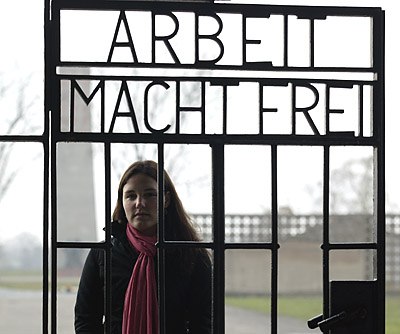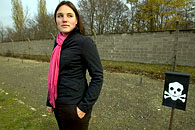Sachsenhausen
Sachsenhausen — by Stephanie Garcia ’06
My visits to Sachsenhausen Concentration Camp conjure in my mind ugly adjectives, powerful nouns, and shocking verbs. But even these words seem inadequate.

Entering the camp gates, I stared at the large roll call area where prisoners, including the dead, were counted in hours-long rituals. As if the barbed wire and electric fence were not enough to deter the prisoners from escaping, a lookout tower, topped with a machine gun, loomed above — another reminder that escape was impossible.
I silently visited the bunkers, where many prisoners were housed, the prison, the medical ward, the mass grave, and the gas chamber. Through headphones, one can listen to prisoners’ accounts. “You know, it goes without saying that you can’t explain to anybody how it was, where every minute death was waiting,” says former prisoner Evzen Seycek.
 As I left that day, my feelings were a tangled knot of despair, melancholy, remorse, and disgust. But as I left, a plaque caught my eye; it read, “Nie Wieder (Never Again).” Such a simple phrase, yet it catches the ultimate intention of Sachsenhausen Concentration Camp. The camp expresses what is impossible to convey through words, imparting the desperate desire to prevent such a horror from happening again.
As I left that day, my feelings were a tangled knot of despair, melancholy, remorse, and disgust. But as I left, a plaque caught my eye; it read, “Nie Wieder (Never Again).” Such a simple phrase, yet it catches the ultimate intention of Sachsenhausen Concentration Camp. The camp expresses what is impossible to convey through words, imparting the desperate desire to prevent such a horror from happening again.